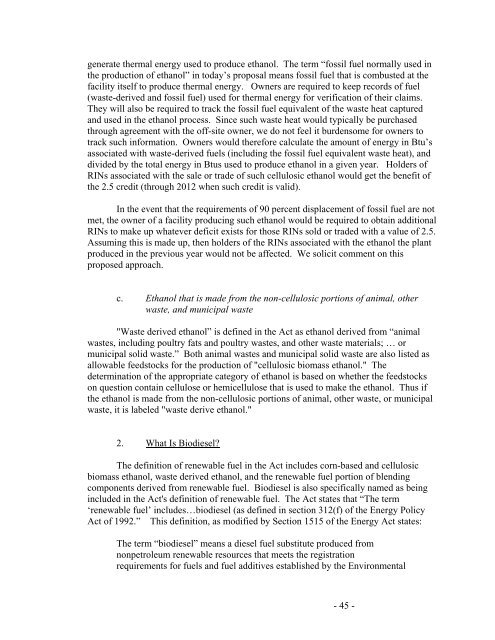Regulation of Fuels and Fuel Additives: Renewable Fuel Standard ...
Regulation of Fuels and Fuel Additives: Renewable Fuel Standard ...
Regulation of Fuels and Fuel Additives: Renewable Fuel Standard ...
Create successful ePaper yourself
Turn your PDF publications into a flip-book with our unique Google optimized e-Paper software.
generate thermal energy used to produce ethanol. The term “fossil fuel normally used in<br />
the production <strong>of</strong> ethanol” in today’s proposal means fossil fuel that is combusted at the<br />
facility itself to produce thermal energy. Owners are required to keep records <strong>of</strong> fuel<br />
(waste-derived <strong>and</strong> fossil fuel) used for thermal energy for verification <strong>of</strong> their claims.<br />
They will also be required to track the fossil fuel equivalent <strong>of</strong> the waste heat captured<br />
<strong>and</strong> used in the ethanol process. Since such waste heat would typically be purchased<br />
through agreement with the <strong>of</strong>f-site owner, we do not feel it burdensome for owners to<br />
track such information. Owners would therefore calculate the amount <strong>of</strong> energy in Btu’s<br />
associated with waste-derived fuels (including the fossil fuel equivalent waste heat), <strong>and</strong><br />
divided by the total energy in Btus used to produce ethanol in a given year. Holders <strong>of</strong><br />
RINs associated with the sale or trade <strong>of</strong> such cellulosic ethanol would get the benefit <strong>of</strong><br />
the 2.5 credit (through 2012 when such credit is valid).<br />
In the event that the requirements <strong>of</strong> 90 percent displacement <strong>of</strong> fossil fuel are not<br />
met, the owner <strong>of</strong> a facility producing such ethanol would be required to obtain additional<br />
RINs to make up whatever deficit exists for those RINs sold or traded with a value <strong>of</strong> 2.5.<br />
Assuming this is made up, then holders <strong>of</strong> the RINs associated with the ethanol the plant<br />
produced in the previous year would not be affected. We solicit comment on this<br />
proposed approach.<br />
c. Ethanol that is made from the non-cellulosic portions <strong>of</strong> animal, other<br />
waste, <strong>and</strong> municipal waste<br />
"Waste derived ethanol” is defined in the Act as ethanol derived from “animal<br />
wastes, including poultry fats <strong>and</strong> poultry wastes, <strong>and</strong> other waste materials; … or<br />
municipal solid waste.” Both animal wastes <strong>and</strong> municipal solid waste are also listed as<br />
allowable feedstocks for the production <strong>of</strong> "cellulosic biomass ethanol." The<br />
determination <strong>of</strong> the appropriate category <strong>of</strong> ethanol is based on whether the feedstocks<br />
on question contain cellulose or hemicellulose that is used to make the ethanol. Thus if<br />
the ethanol is made from the non-cellulosic portions <strong>of</strong> animal, other waste, or municipal<br />
waste, it is labeled "waste derive ethanol."<br />
2. What Is Biodiesel?<br />
The definition <strong>of</strong> renewable fuel in the Act includes corn-based <strong>and</strong> cellulosic<br />
biomass ethanol, waste derived ethanol, <strong>and</strong> the renewable fuel portion <strong>of</strong> blending<br />
components derived from renewable fuel. Biodiesel is also specifically named as being<br />
included in the Act's definition <strong>of</strong> renewable fuel. The Act states that “The term<br />
‘renewable fuel’ includes…biodiesel (as defined in section 312(f) <strong>of</strong> the Energy Policy<br />
Act <strong>of</strong> 1992.” This definition, as modified by Section 1515 <strong>of</strong> the Energy Act states:<br />
The term “biodiesel” means a diesel fuel substitute produced from<br />
nonpetroleum renewable resources that meets the registration<br />
requirements for fuels <strong>and</strong> fuel additives established by the Environmental<br />
- 45 -
















